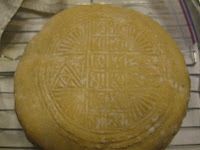Deut 31:26 Take this book of the law, and put it in the side of the ark of the covenant of the LORD your God, that it may be there for a witness against the.
The book of the law was a witness against them because it showed what they must do--and they didn't do it. But the ten commandments did as well.
The Book of the law contained moral, as well as "ceremonial" laws.
It talks about:
- Oaths
- Sexual sins (homosexuality, bestiality, incest, etc.)
- Responsibility and liability (if your animal gores someone, and you knew it had before, injuring someone in a fight, failing to cover a pit, animal grazing in neighbor's field)
- kidnapping
- self defense in a break-in
- no sorcery, necromancy, etc.
- not oppressing foreigners, orphans, widows, poor
-loans and interest
- respect for rulers
- Need to be proactively helpful (if you see your neighbor's animal wander away)
- bribes
Etc.
Even the two greatest commands were in the OT, but not the ten commandments. Upon those the whole law was said to hang.
That is to say, all the specifics within the law are the outflow of those two commands.
And any of the laws were "moral" in the sense that if you didn't do them you could die for it. They were all required, and all about right and wrong in the sense that God commanded them.
But we do distinguish as you indicated between civil, ecclesiastical etc. There are some things that are obvious lasting principles beyond the specific time and circumstances of the Israelites. And there are some that were to point to the remission of sins through Christ, and so they are fulfilled by His work.
But notice that in
Matthew 5 Jesus talks about how He did not come to destroy the law--and it is not just the ten.
17 Think not that I am come to destroy the law, or the prophets: I am not come to destroy, but to fulfil.
18 For verily I say unto you, Till heaven and earth pass, one jot or one tittle shall in no wise pass from the law, till all be fulfilled.
19 Whosoever therefore shall break one of these least commandments, and shall teach men so, he shall be called the least in the kingdom of heaven: but whosoever shall do and teach them, the same shall be called great in the kingdom of heaven.
He then goes through to elaborate on the law, with the formula, "Ye have heard that it was said.
He references the murder and adultery commands. However, he also references other points of the law, outside the ten commandments:
- Divorce
- oaths
- loving your neighbor and hating your enemy
We at times see "law" and think it only means the ten commandments. But it went beyond that.
Now the ten commandments being on tables of stone did set them apart. And we can discuss why that was. But all of the law was required, and even the NT recognizes some of the moral requirements in the book of the law. Paul in I Corinthians 5 still condemns incest. In chapter 6,
Romans 1, etc. he still condemns homosexuality. He even establishes that it is right to pay those who minister in the gospel by referencing the ox treading out the grain receives food, etc.
And Paul sums up this usage of the law in Timothy:
5 Now the end of the commandment is charity out of a pure heart, and of a good conscience, and of faith unfeigned:
6 From which some having swerved have turned aside unto vain jangling;
7 Desiring to be teachers of the law; understanding neither what they say, nor whereof they affirm.
8 But we know that the law is good, if a man use it lawfully;
9 Knowing this, that the law is not made for a righteous man, but for the lawless and disobedient, for the ungodly and for sinners, for unholy and profane, for murderers of fathers and murderers of mothers, for manslayers,
10 For whoremongers, for them that defile themselves with mankind, for menstealers, for liars, for perjured persons, and if there be any other thing that is contrary to sound doctrine;
11 According to the glorious gospel of the blessed God, which was committed to my trust.
Now we agree that the need for sacrifices was fulfilled. However, it gets more complicated on laws related to other aspects. We recognize the principle of personal responsibility, if you are neglectful and a fire starts that burns your neighbor's land. The law addresses this too. We may not handle everything the way the law did in the specific application of the land of Israel. But we still see the moral principle behind it, and hold a person accountable when they have been neglectful.
In this sense even the ten commandments express moral principles, but within the specific context of Israel's covenant.
So for instance, we see:
12 Honour thy father and thy mother: that thy days may be long upon the land which the Lord thy God giveth thee.
The specific promise relates to their remaining in the promised land which He gave to them. But Paul still notes the validity of the command for those in Ephesus, but applying the promise more generally apart from the context of the holy land.
6 :1 Children, obey your parents in the Lord: for this is right.
2 Honour thy father and mother; which is the first commandment with promise;
3 That it may be well with thee, and thou mayest live long on the earth.
So the principles behind the law are universal, and this includes laws in the book of the law. The mainly gentile audience of the Corinthian church were still expected to follow the principle against incest, despite never being under the mosaic covenant, because it was manifest from the law that God opposes it.


